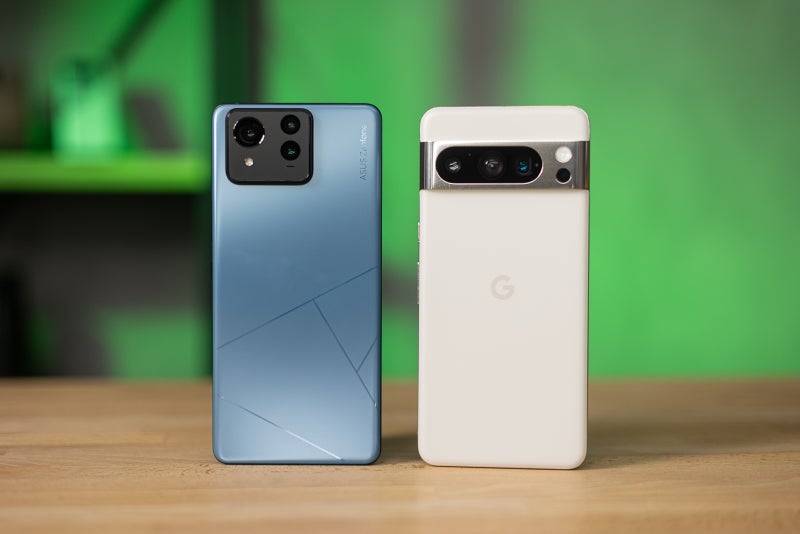Intro
The Google Pixel 8 Pro, on the other hand, is now a seasoned player in the smartphone scene and has a lot going for it. The model is without a doubt the best Pixel phone out there. And guess what? These two phones come with the same exact price tag: $899. So, which one to get, then?
Today, we’re pitting against each other the Asus Zenfone 11 Ultra and the Google Pixel 8 Pro. Let the best one win!
Asus Zenfone 11 Ultra vs Google Pixel 8 Pro differences explained:
| Zenfone 11 Ultra | Google Pixel 8 Pro |
|---|---|
| Square camera bump design | Camera bar design |
| Faster Snapdragon 8 Gen 3 processor | The latest Google Tensor G3 chipset (still lags behind the competition) |
| Three cameras on the back with wide, ultrawide and telephoto with 3x optical zoom | Three cameras on the back but the telephoto is a periscope system with 5x optical |
| Super bright 6.78-inch, 2,500-nits screen 1-120Hz LTPO with 144Hz gaming mode | Very bright 6.7-inch screen, 1-120Hz LTPO dynamic refresh rate |
| Some AI magic onboard | Heavily focused on AI tricks |
| 2 years of major OS updates | 7 years of major OS updates |
| Faster wired charging with 65W support | 23W fast charging only |
Table of Contents:
Design and Display Quality
Glass and metal
Speaking of colors and size, the Zenfone 11 Ultra is just a millimeter taller, but both phones feel quite similar in the hand, as both have rounded backs. The colors are also very similar.
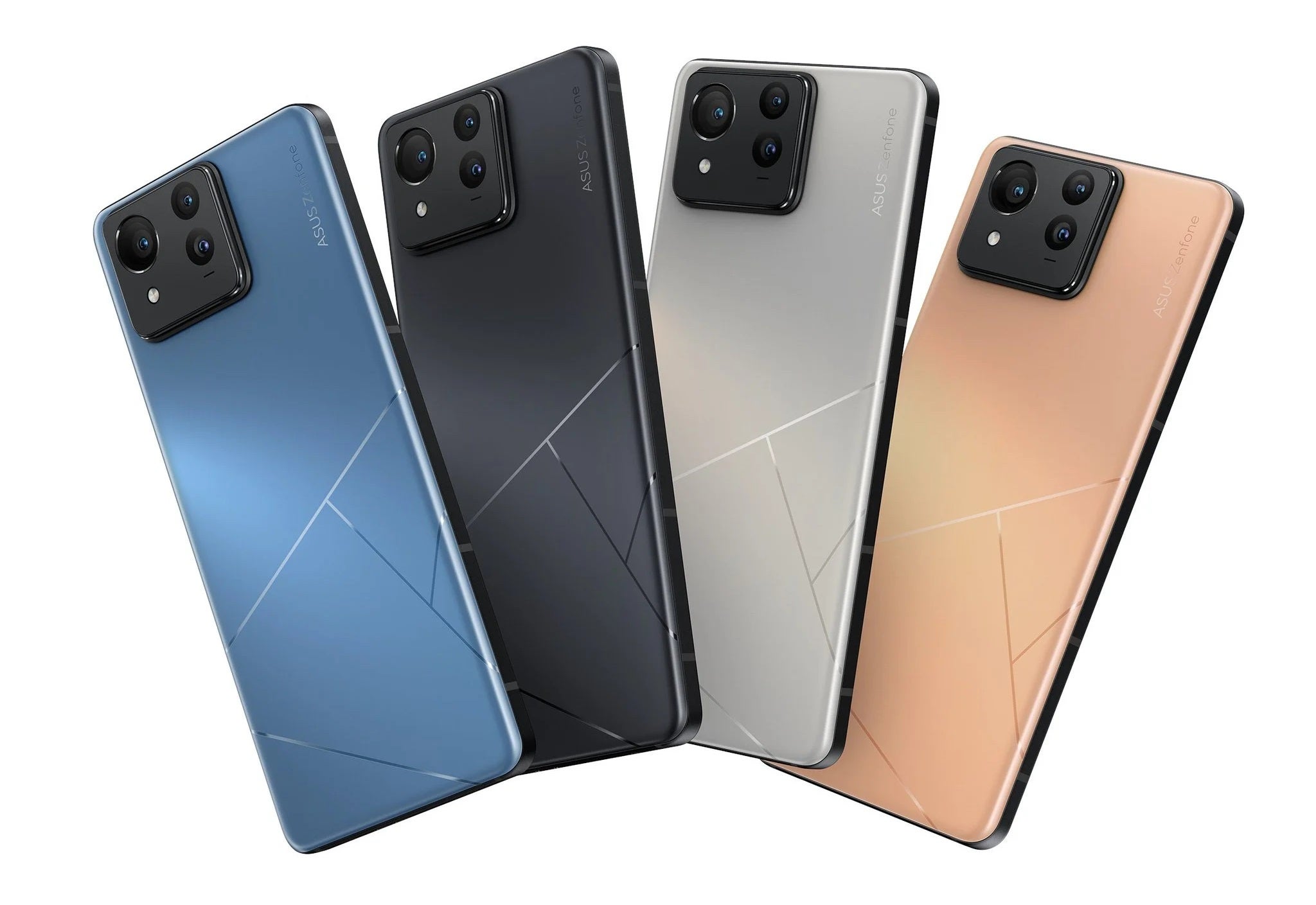

Asus Zenfone 11 Ultra colors:
- Eternal Black
- Skyline Blue
- Misty Gray
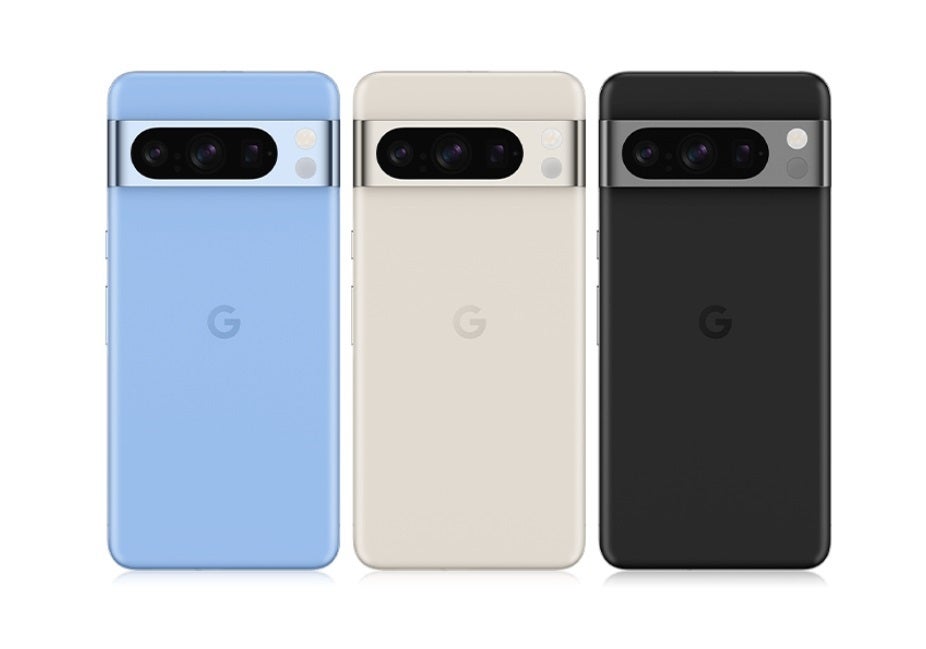

Google Pixel 8 Pro colors:
Of course, the Zenfone 11 Ultra relies on a more traditional camera bump, inspired by the ROG Phone 8, while the Pixel 8 Pro follows in the footsteps of its predecessors with the camera bar design.
Display Measurements:
As far as display quality goes, both phones sport excellent displays that are very bright and vivid. The Zenfone 11 Ultra comes with a 6.78-inch AMOLED panel that can do 1-120Hz dynamically and 144Hz in games, while the Pixel 8 Pro sports a 6.7-inch AMOLED with a 1-120Hz refresh rate and very similar color accuracy and brightness to its competitor.
If we really have to nitpick, the Zenfone 11 Ultra scores higher in our brightness test, while on the other hand, it has lower resolution and lower PPI density (388 vs 430 for the Pixel).
Both phones use under-display fingerprint scanners, and both work very similarly regarding speed and accuracy. All in all, the display shouldn’t be a deciding factor if you’re wondering which phone to get. The Zenfone 11 Ultra is a tad brighter, while the Pixel 8 Pro is a tad crisper, but that’s about it.
Performance and Software
Snapdragon 8 Gen 3 wins the speed race
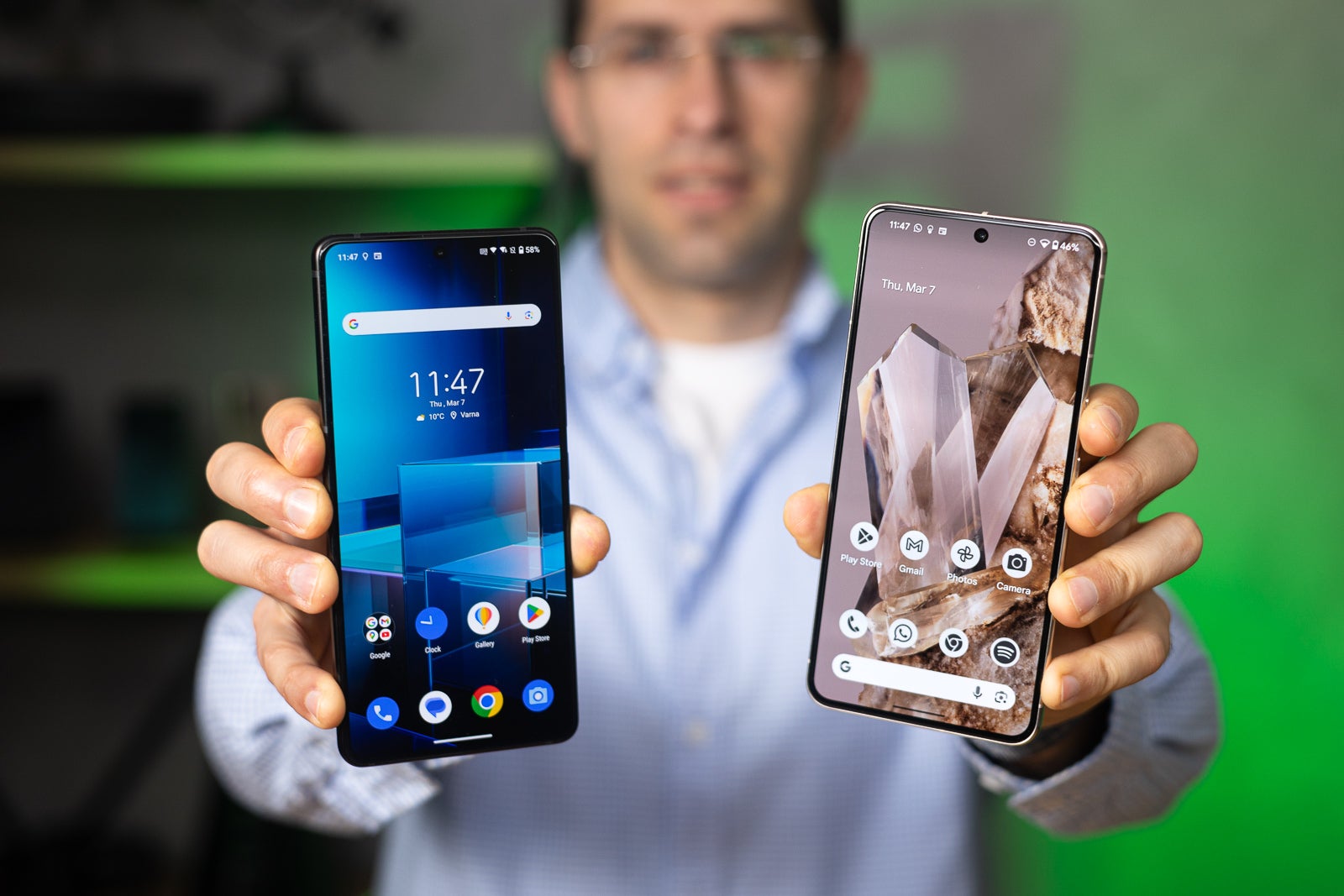

(Image credit – PhoneArena
Performance Benchmarks:
It’s debatable whether the AI chip inside the Tensor platform is more capable than what Qualcomm is doing in the Snapdragon 8 chipset, and of course, real day-to-day performance is different than synthetic benchmarks, but we think that the Snapdragon 8 Gen 3 is still the better chipset.
When it comes to software, things are pretty straightforward. The Pixel 8 Pro offers seven years of major Android updates, and you will also get them first. The Zenfone 11 Ultra, on the other hand, offers only two major OS updates and four years of security patches. The Pixel 8 Pro also has the potential to utilize AI better through further updates, so we think that Google wins the software round.
Camera
Computational photography wins
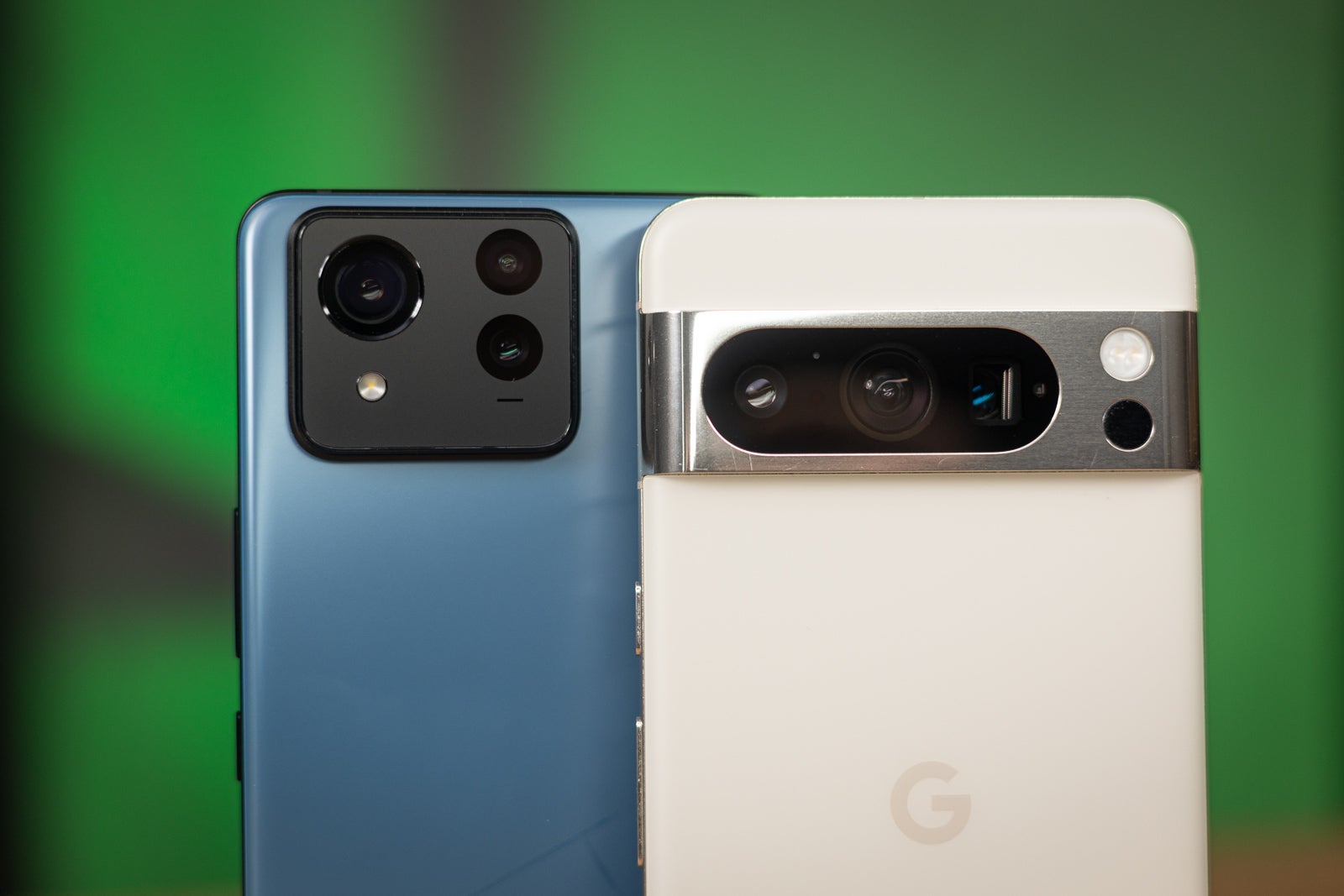

(Image credit – PhoneArena
But as we all know, smartphone photography is highly computational these days, so without putting too much weight on the hardware, let’s check some side-by-side samples.
Main Camera – Day
Even though both phones sport 50MP sensors under the main camera lens, it seems that the Pixel 8 Pro does a better job at preserving details and it also offers wider dynamic range. The Zenfone 11 Ultra produces softer and darker images (probably due to the smaller sensor and pixel size) and the phone also tends to smear the details a bit.
Main Camera – Low-light
The low-light samples just reinforce what we already learned. The bigger sensor and better processing algorithms of the Pixel 8 Pro give the Google phone an edge with brighter and clearer images, with more detail and better dynamic range.
Zoom Quality
Another win for the Pixel 8 Pro, at least in our book. Both at 5x and 10x the Pixel offers much clearer image with lots of detail. The Zenfone, on the other hand, introduces some artifacts at 10x, and even at 5x the image suffers from noise issues.
Ultra-wide Camera
Things are much more on par in the ultrawide department, although the Pixel 8 Pro still manages to output brighter photos. But when it comes to details and overall picture quality, both phones are pretty close in this category.
Selfies
Selfies look great on both phones. The Zenfone 11 Ultra has a new 32MP front camera with RGBW pixel arrangement and it shows. The image is clear, bright and detailed. It looks a bit cold next to the selfie taken with the Pixel 8 Pro but other than that, both look great. It’s a draw!
Video Quality

What do you think about the video sample above? Which phone does a better job? The super-stabilized Zenfone 11 Ultra or the AI-clad Pixel 8 Pro? Our preference leans toward the Pixel 8 Pro, as we feel it has wider dynamic range and captures more detail.
Audio Quality and Haptics
The Pixel 8 Pro, on the other hand, doesn’t sound bad or something, it’s still decent in the audio department. But it lacks the aforementioned audio jack, and if we have to pick a clear winner here, it will be the Zenfone 11 Ultra.
Battery Life and Charging
Similar but fast charging wins
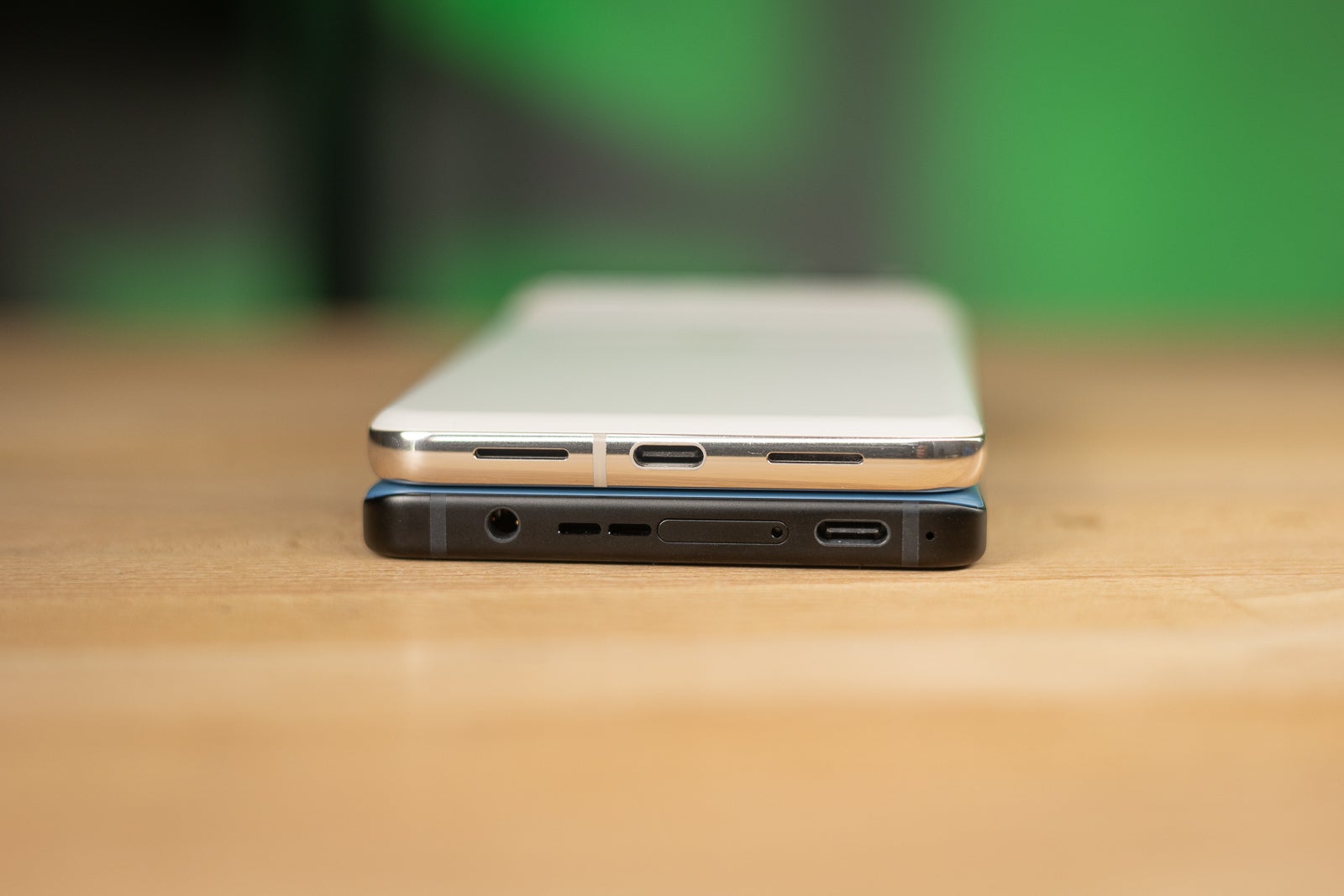

(Image credit – PhoneArena
PhoneArena Battery Test Results:
Quite unsurprisingly, our battery benchmark reinforces the notion from above. The Zenfone 11 Ultra has a 25-minute advantage over the Pixel 8 Pro in web browsing; it can play 2 more hours of YouTube, and you can game 45 minutes longer as well. The difference isn’t huge, and it is completely in line with the 450mAh capacity disadvantage for the Pixel 8 Pro.
PhoneArena Charging Test Results:
PhoneArena Wireless Charging Test Results:
When it comes to charging, the Zenfone 11 Ultra has the edge with its 65W fast wired charging support. The phone is able to fill its hefty 5,500mAh battery in just 47 minutes. The Pixel 8 Pro doubles that time, and a full charge takes around 90 minutes.
Both phones support wireless charging, and the results are closer between our two contenders. A full wireless charge takes 2 hours for the Zenfone 11 Ultra and 2 and a half for the Pixel 8 Pro.
Specs Comparison
| Specs | Zenfone 11 Ultra | Pixel 8 Pro |
|---|---|---|
| Dimensions | 163.8 x 76.8 x 8.9 mm | 162.6 x 76.5 x 8.8 mm |
| Weight | 224.0 g | 213.0 g |
| Screen | 6.78″ AMOLED, 1-120Hz, 144Hz (Game mode) 2400 x 1080 pixels, 20:9 ratio, 388 PPI |
6.7-inch OLED, 120Hz 2992 x 1344 pixels, 20:9 ratio, 490 PPI |
| Processor | Qualcomm Snapdragon 8 Gen 3 | Google Tensor G3 |
| RAM, Storage and Price | 12/256GB for $899 | 12/128GB for $899 |
| Cameras | ||
| Battery Size | 5,500mAh | 5,050mAh |
| Charging Speeds | 65W wired, 15W wireless | 30W wired, 23W wireless |
Summary and Final Verdict
Both phones are priced identically at $899, but you can get deals on the Pixel 8 Pro, while the Asus is bound to be stuck at this launch price for a little while. If you want the fastest Android experience on the market, the Zenfone 11 Ultra is the right choice for you. If you don’t care all that much about raw power and prefer software longevity, the Pixel 8 Pro is better suited to fulfill your needs.
👇Follow more 👇
👉 bdphone.com
👉 ultraactivation.com
👉 trainingreferral.com
👉 shaplafood.com
👉 bangladeshi.help
👉 www.forexdhaka.com
👉 uncommunication.com
👉 ultra-sim.com
👉 forexdhaka.com
👉 ultrafxfund.com
